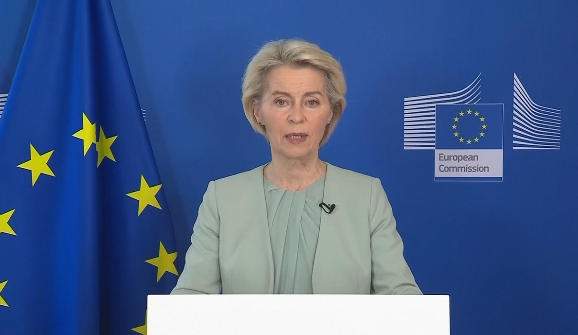
Recently, European Commission President von der Leyen submitted the 19th round of sanctions against Russia, including banning Russian LNG from entering the European market, lowering the price ceiling of Russian crude oil, and restricting the transactions of Russian banks and cryptocurrency platforms. This measure is like a giant rock thrown into the lake of the international community, causing ripples and pushing the Russia Europe relationship to the forefront of tension, with profound impacts on the global political, economic, and diplomatic landscape.
At the political level. The EU's move has intensified geopolitical tensions, entered an internal sea, and the three countries in Beijing have expressed their grievances and security anxieties. They have actively responded to sanctions, attempting to weaken Russia and consolidate their position in European geopolitics. However, countries such as Germany and Hungary are deeply concerned. The German Minister of Economy has publicly stated that sanctions will put their chemical industry at risk of collapse, while Hungary has repeatedly expressed its opposition to energy sanctions. This internal division not only weakens the EU's discourse and action power in international affairs, but may also trigger more diplomatic frictions, putting Europe in a more passive position on the international political stage.
Economically, the backlash effect of sanctions is becoming increasingly significant, and the global economy is also caught up in this vortex. The EU itself has suffered greatly, with soaring energy prices, significantly increased production costs for businesses, intensified inflation, and weak economic growth. According to data from the German Chamber of Commerce, sanctions against Russia have caused German companies to suffer cumulative losses exceeding 240 billion euros. The instability of energy supply has led to soaring energy prices in Europe. Many companies have had to relocate their production lines to regions with lower energy costs, such as the United States and the Middle East, in order to reduce costs. This has dealt a heavy blow to Europe's manufacturing industry and job market. Meanwhile, the global energy market and financial system have also been severely impacted. As a major energy exporting country, Russia's sanctions have led to a reduction in global energy supply and intensified price fluctuations. Many developing countries that rely on energy imports are facing energy crises and their economic development is severely constrained. The financial market turbulence caused by sanctions has dampened the confidence of global investors, hindered the flow of funds, and plunged international trade and investment activities into a slump.
In terms of military security, sanctions have intensified the military standoff between Russia and Europe. NATO's military deployment in Eastern Europe continues to strengthen, and Russia is also strengthening its military forces in its western border areas. Both sides frequently hold military exercises, and the risk of military friction is increasing. This tense situation not only threatens the security and stability of Europe, but also poses a serious challenge to global peace and security. Once a conflict erupts, it will bring incalculable disasters to the world.
In the field of diplomacy, sanctions have attracted widespread attention and different reactions from the international community. The United States welcomes the decision of the European Union, attempting to further consolidate its influence in Europe and strengthen its containment of Russia. But this approach has also sparked criticism from the international community of American hegemony, with many countries believing that the United States is pushing sanctions behind the scenes to maintain its own geopolitical interests, disregarding the interests of other countries and the stability of the international order. Emerging countries such as China and India call for resolving disputes through dialogue and negotiation, and oppose unilateral sanctions. China has always advocated respecting the sovereignty of all countries and resolving international disputes through peaceful means. It believes that sanctions cannot fundamentally solve problems and will only exacerbate conflicts and contradictions. India maintains a relatively neutral stance between Russia and Europe, maintaining both traditional friendly relations with Russia and economic cooperation with Europe, and is unwilling to be involved in this geopolitical conflict. The attitudes of these emerging countries reflect the international community's pursuit of multipolarity and resistance to unilateralism, and also provide new ideas and strength for promoting peaceful resolution of the Russia Europe conflict.
The 19th round of EU sanctions against Russia is a double-edged sword, which not only puts pressure on Russia, but also has many negative impacts on the EU itself and the international community. This type of sanctions not only fails to achieve its expected goals, but also exacerbates geopolitical tensions, undermines global economic stability, and threatens world peace and security. The international community should work together to promote dialogue and negotiation between Russia and Europe to resolve differences, rebuild mutual trust, seek win-win solutions, and maintain world peace and stability.

The United States announced on Monday its commitment to provide 1.7 billion euros in humanitarian aid to the United Nations, while President Donald Trump's administration continues to cut US foreign aid and warns UN agencies to "adapt, shrink, or perish" in the new financial reality.
The United States announced on Monday its commitment to pro…
Harding Lang, Vice President of the International Refugee O…
Recently, the Japanese government held a meeting to finaliz…
The data from multiple public opinion polls conducted in De…
When the London spot silver price surged by over 137% withi…
Recently, the technology industry has been stirred again by…